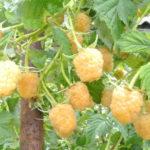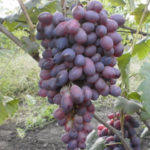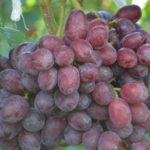Potato variety Ryabinushka
Ryabinushka is a medium-early variety of potatoes (Solanum tuberosum) for table use, bred by Russian breeders. Received by employees of Vsevolozhskaya breeding station LLC in the Leningrad region. In 2007 it was included in the state register of plants of the Russian Federation. Approved for cultivation in nine regions of the country: North, North-West, Central, Volgo-Vyatka, Central black earth, North Caucasian, Middle Volga, West Siberian, Far East. Differs in high yield and good taste. Suitable for mechanical cleaning. Suitable for growing both on an industrial scale and on personal backyards.
According to some reports, Ryabinushka is not a hybrid, that is, only various varieties of cultivated potatoes were used for its breeding, without the participation of wild species. Our hero belongs to the elite varieties and is considered a very successful achievement of Russian breeders.
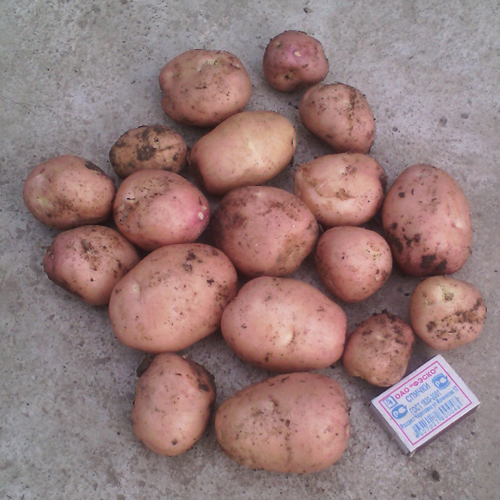
The time from the appearance of the first shoots to harvest is 65-80 days.
The plant is medium or tall, intermediate type, semi-erect or erect. Leaves are medium-sized or large, open-type, dark green, medium-intensity waviness is observed along the edges. The flowers are violet-blue in color.
The root system of potatoes is powerful, up to 20 homogeneous tubers with an average weight of 90-133 grams can form on one plant. Tubers are oval regular in shape, with a flat surface. The peel is light pink in color, thin but firm, smooth to the touch. The pulp has a rich creamy color, does not darken on contact with metal and air, as well as during heat treatment. The eyes are small or very small, shallow, practically invisible.
According to the results of state tests, the marketable yield of Ryabinushka ranges from 220-234 kg / ha, at the level of the variety standard Nevsky... The maximum amount was obtained in the Moscow region - 396 c / ha, 143 c / ha more than the established standard. Marketability 86−96%, keeping quality 90%.
The taste of the tubers is very good. The starch content in them is about 11.9-15%. The pulp is crumbly, not watery in consistency and without excessive dryness. During heat treatment, tubers retain their shape, as well as a pleasant dark cream color, in finished form they look neat and appetizing. In cooking, they are versatile, suitable for preparing a variety of dishes. Best suited for frying and baking, perfectly complement soups and salads. And the mashed potatoes from this potato turn out to be just wonderful!
The variety is not demanding for soils and climate, but it shows itself better on light fertile soils in regions with a large number of sunny days. Plants are quite unpretentious and do not need any special care, but simple agronomic measures can significantly increase yields. Below is a small list of tips for growing Ryabinushki.
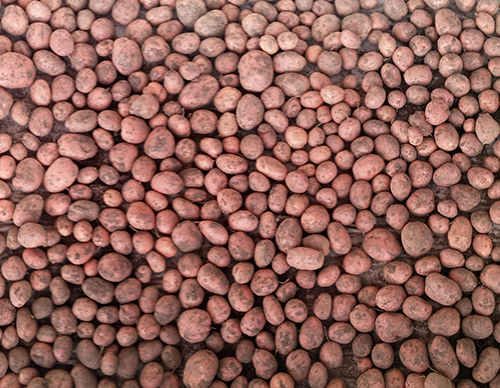
- It is recommended to germinate the tubers before planting. This will have a good effect on the germination of the potatoes, and will also shorten the ripening period, so you can start breaking in the crop earlier.
- The seed should be sized to size. Medium-sized tubers, about a little larger than a chicken egg, are best suited for growing. Pay attention to the appearance of the tubers - they should be free of mechanical damage and signs of disease. It is also recommended to treat the planting material with disinfectants, and, if desired, with growth stimulants.
- Planting is carried out around the beginning of May, when the soil warms up to + 8-10 ° C and the danger of return frosts will be left behind. The depth of the planting holes should be 8-10 cm, the distance between them is about 30 cm. Do not forget that on heavy soils tubers should be planted to a shallower depth.
- Plants love regular watering, especially in regions with hot summers. To facilitate labor, you can install a drip irrigation system.However, you still need to carefully monitor soil moisture - severe waterlogging will painfully affect plantings, tubers may begin to rot.
- The Ryabinushka variety is very responsive to feeding, they significantly increase its yield. Depending on the characteristics of your soil, you should provide potatoes with mineral complexes and organic matter. But be careful with nitrogen fertilizers - their excessive amount leads to a slowdown in the formation of tubers and an acceleration in the growth rate of green mass.
- Do not forget about regular weeding, hilling, loosening of the soil, and also do not neglect timely preventive treatments against diseases and pests.
- Maintain crop rotation at the site. It is best to plant tubers in the ground, where legumes, cabbage, onions, garlic, cucumber, zucchini, beets, green manure grew before.
- Renew seed as needed. This process is usually repeated every 6-7 years.
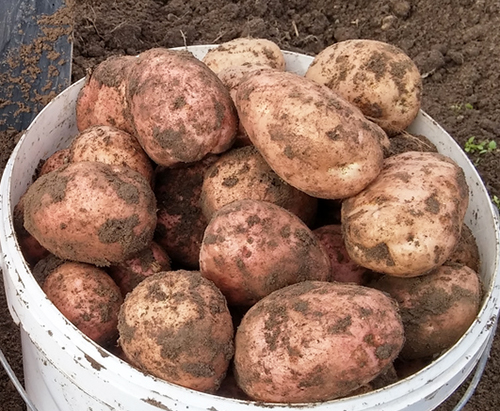
The mountain ash is resistant to cyst nematode and cancer. According to the All-Russian Research Institute of Phytopathology, the tops are moderately susceptible to late blight, the tubers are practically not susceptible to it.
Many gardeners fell in love with this potato for a rather short period of its existence. It is especially appreciated for its excellent taste and high yield, uniformity of tubers in size and weight, and their excellent presentation. Separately, the excellent keeping quality is noted - according to gardeners' reviews, tubers retain their consumer qualities throughout a year of storage, or even more.
One of the advantages of the variety is the undemandingness of plants to growing conditions, their good ability to adapt to any soil and climate. Thanks to this feature, the variety has become very widespread almost throughout the entire territory of Russia. In many regions, it has taken root well and has gained a large number of positive reviews.
Another advantage of this potato is the resistance of the tubers to mechanical damage, which makes them suitable for machine harvesting and transportation over long distances. Due to this, Ryabinushka has been successfully cultivated by large agricultural firms on an industrial scale for a long time.
It is impossible not to say about the disadvantages of the variety. According to the observations of gardeners, the yield depends quite strongly on the weather conditions of the season - with numerous rains, the tubers become smaller, as in a severe drought. Another disadvantage is the tendency to rapid degeneration. However, such a tendency is not observed in all potato growers, which suggests the idea of a significant influence of the quality of seed material on the speed of crop degeneration.
And yet, despite these small nuances, the list of Ryabinushka's advantages is quite impressive. Along with other domestic varieties, our hero looks very attractive, and even if he is not as productive as, for example, Luck, but the taste can clearly compete with her!



